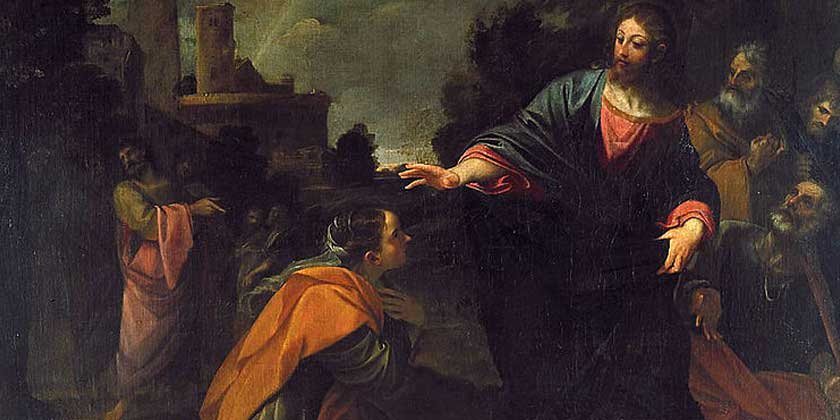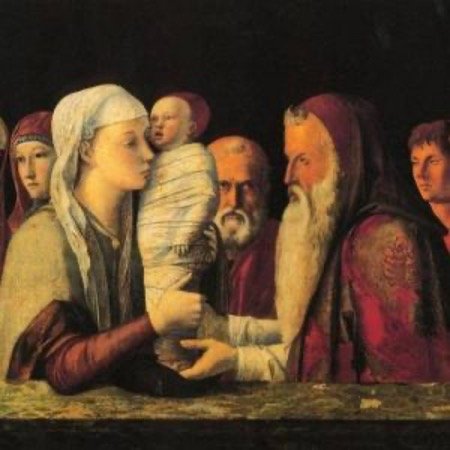
by f. Luis CASASUS, General Superior of the men’s branch of the Idente Missionaries.
New York, August 16, 2020.| XX Sunday in Ordinary Time.
Book of Isaiah 56: 1.6-7; Letter to the Romans 11: 13-15.29-32; Saint Matthew 15: 21-28.
Many authors have noted the similarity between Plato’s so-called Socratic Dialogues and Jesus’ way of teaching and helping to understand truth. To this day, the “Socratic Metod” is understood as teaching by answering peple’s questions with questions, helping them discover the truth for thamselves, and discovering what is already in them. Education literally means “leading out”, a way to model our ecstasy.
In today’s Gospel text, we find an admirable encounter of Jesus with a generous and courageous woman, which Christ uses to show her, and above all his disciples, what our true relationship with God is, how he loves us paternally, despite our behaviour or the negative image we have of ourselves.
The disciples wanted the Canaanite woman – a non-Israelite – sent away. She was causing a scene by shouting out after them. The disciples are obviously embarrassed: Give her what she wants, because she is shouting after us!
As soon as Jesus starts speaking the woman is kneeling at his feet, and so Jesus must have seen her earnestness and, what he later says is her faith. As Jesus responds to her, he speaks those attitudes of his day that would have been accepted by many: he gives voice to the bigotry between Jew and gentile; chosen and not chosen and starts giving the reasons why he shouldn’t help this non-Jewish woman. In other words, He starts saying what others would have been thinking. The Israelites are the sheep; the Gentiles are the dogs. The use of the diminutive mitigates, but not by much, the harshness of the offense. Throughout the ancient Middle East, “dog” was the cruelest insult. It was the nickname with which the Jews called the pagans.
Jesus was playing the part of the integral and pure Israelite to show how ridiculous and senseless the separatist mentality cultivated by his people was.
All of us have some trait of discrimination, of partiality. It is not easy for us to love everyone equally, to treat everyone with the same consideration. Age, sex, culture, character, religion, nationality, disabilities… are many factors that condition us and it is necessary to have a true grace, a deep spiritual state in order not to be influenced by so many labels and prejudices that lead us to discriminate and to be respecters of persons.
Christ was used to suffering discrimination in his flesh: Is this not the son of Mary and the carpenter? How can a prophet come out of Nazareth? Moreover, during his public ministry, he was rejected in many cities, for example in Samaria.
Not all Art History books tell the following episode:
For 35 years “the Giant” sat abandoned in the work yard of the cathedral of Florence. The Giant was a block of pure white marble, 18 feet tall and weighing several tons. However, a big hole that penetrated deep into the column’s side made it virtually useless. Many sculptors had examined the Giant, hoping they could find a use for it, but they all eventually rejected it because they couldn’t figure out a way to work around the hole. However, when Michelangelo spotted the Giant, he saw a magnificent stone from which he could carve what would become his masterpiece, David the Giant Killer.
In 1501, his petition to sculpt the Giant was granted. As Irving Stone wrote in his book The Agony and the Ecstasy, Michelangelo solved the problem of the hole by tilting his figure twenty degrees inside the column…so that David’s left side could be fitted into the remaining marble. With hammer and chisel in hand, he found himself impatient for that first moment when a flicker of a buried image shone through, when the block became a source of life that communicated with him.
Of course, we have a very poor view of our neighbors, similar to the disciples who accompanied Jesus in today’s event. God is the supreme artist who looks beyond our flaws and sees the image buried inside that’s waiting to come out. He wants to chip away at what doesn’t belong. Perhaps a sin in our life, a bad habit, or a negative attitude that keeps us from being what God wants you to be. We see defects and remember mistakes and offenses. The Holy Spirit sees opportunities, occasions to approach us. Both of these views are real. They are parallel universes.
Saint Francis de Sales says:
In general, we prefer the rich to the poor…we even prefer those who are better dressed. We rigorously demand our own rights, but want others to be considerate in insisting on theirs. We complain easily about our neighbors, but we would expect them to never complain about us. What we do for others always seems so very great, but what others do for us seems like nothing at all. In short, we have two hearts. We have a mild, gracious and courteous attitude toward ourselves but an entirely different demeanor that is hard, severe and unyielding toward others (Introduction to the Devout Life).
To the south of Jerusalem, the “Potter’s Field” was bought with silver coins returned by Judas to the priests of the temple. To be buried there was considered the height of ignominy. It was a cemetery to bury strangers. The impure and unclean Gentiles had to be kept separated from the sons of Abraham even after death.
The tendency to discrimination, to erect barriers between good and evil, pure and impure, saints and sinners are deeply rooted in our heart. They manifest themselves in a variety of ways: fear of confrontation, inability to have an open, serene and respectful dialogue with those who have different opinions, etc. Sometimes these impulses are camouflaged behind the complaint of real dangers, syncretism, loss of identity, the renunciation of one’s values.
Psychology and Sociology have explored the roots of discrimination and possible ways to avoid it, with only relative success. Today’s Gospel, with Christ’s way of acting, shows us that God cares for each and every human being. And the conclusion is clear: How can I leave anyone out of my love? In the same vein, St Paul spoke of his mission to the Gentiles: Let me tell you pagans this: I have been sent to the pagans as their apostle, and I am proud of being sent. And it does not cease to surprise us that already in today’s First Reading, in the Old Testament, eight centuries before Christ, Isaiah tells us that the strangers who honor the Lord and put into practice his commandments will be accompanied to his temple. They will offer sacrifices and raise prayers. In the house of God, no one will be considered foreigner.
It is true that faith is a gift, something we receive without deserving it. It is also true that not all of us who receive it use it properly. Jesus says that the more you receive, the more will be required of you. That is why we can say that God is no respecter of persons.
The spiritual argument for not being prejudiced against people, for not discriminating against them or treating them differently is not that they have wonderful virtues, but that God the Father has entrusted the Holy Spirit to work on their soul, to carve it meticulously and mysteriously like Michelangelo did with “the Giant” rock. The truth is we are all unworthy. However, despite our unworthiness, God wishes and works for our entry into the kingdom of heaven to begin right now. That is one of the powerful messages of the Beatitudes.
Today is an appropriate time to remember that God has a plan (… and follows it carefully!) for every human being. A different thing is that due to my limited sensitivity and impatience I do not perceive it. In this impressive encounter of Jesus with the Canaanite mother, we are taught that God’s love is for all people. Whether other people tell us we’re not worthy, or whether we tell ourselves we are not worthy, this does not change God’s attitude to us.
To continue with the great Michelangelo, he once said:
In every block of marble, I see a statue as plain as though it stood before me, shaped and perfect in attitude and action. I have only to hew away the rough walls that imprison the lovely apparition to reveal it to the other eyes as mine see it.
Those of us who allow the Holy Spirit to carve away what doesn’t belong in our lives will eventually find that we, too, have been set free. Free to be our true selves, sons and daughters, sculpted into the image and likeness of Jesus. Just as Michelangelo saw the statue before he ever started to carve, God sees us, already shaped and perfect in attitude and action. Everything He does is the careful hewing away of all that still imprisons us in marble darkness.
This analogy should remind us that all purification is really necessary, often painful and always with surprising results, both for the one who is purified and for those around him or her. But the central objective of all purification is a new form of union with the divine persons, which would be impossible without allowing the hand of the Great Sculptor to work in me.
That is why the Mystical Recollection and Quietness are so essential and universal. Let us remember that they are not the private property of Christians. The Canaanite woman opened her intelligence, her feeling and her heart, putting aside her condition of gentleness to approach the one who was inviting her, without words, but with visible deeds, to share with him her pain and her generosity.
The Jews rejected the Gospel and their call to be the light for the nations. “Since their rejection meant the reconciliation of the world, do you know what their admission will mean? Nothing less than a resurrection from the dead!” Indeed, how often, many of us take our faith, the Eucharist and the sacraments in the Church for granted. There is a tragedy for those who have been blessed with the gift of salvation but do not treasure it.
In our ascetical prayer, one of the efforts to be made is to reflect on how to use our resources, talents, abilities. This is part of the content of the Formulative Union, as our founding father Fernando Rielo calls it. Many of us simply remain in the “first phase”, in avoiding their deterioration, like the fearful servant in the parable, who buried the talent given by his master.
A very clear teaching of the generous and courageous attitude of the Canaanite woman is that God has chosen us and blessed us for the glory and service of God and humanity: You are my servant, Israel, in whom I will be glorified (Isa 49:3). Whatever we have, our talents, resources and our faith are meant for others. If we hoard them for ourselves, we would have done ourselves a disfavor because the gifts would have been wasted on us and others deprived of our blessings. That is why Christians are called to be evangelizers and missionaries for Christ.
In the same way, she teaches us that perseverance in our prayer is not to “convince” God to change his mind or to be inclined to our desires, but to convince ourselves of our smallness, of the real need we have of His hand. We persevere because we do not always understand how God is answering our prayers; we persevere because it’s only over time that we start seeing things from a divine perspective, rather than just our own perspective, which can get blinkered and limited by our anguish and selfishness, perhaps without our even realizing it.











